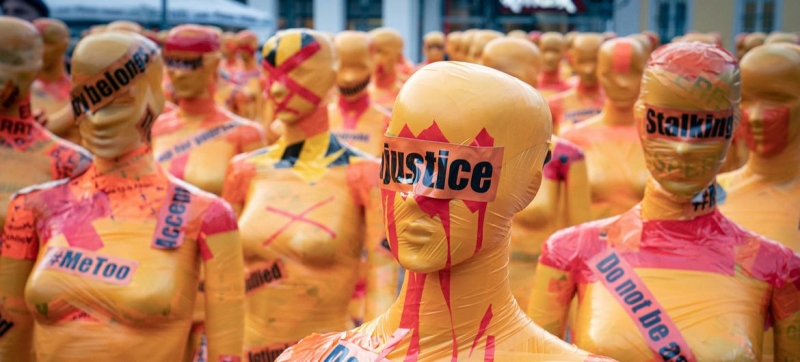
Given the global nature of the entertainment industry, its challenges are not limited to one geographic region. Report of the UN Independent Expert: Minors and the Entertainment Industry Human Rights
Predatory sexual behavior is the norm in the entertainment industry, with directors, producers, managers and agents routinely abusing their power with impunity against aspiring artists. This is stated in a report on the sexual exploitation of children in the entertainment industry. It was presented on Tuesday at the Human Rights Council by an independent UN expert.
The study was conducted by the Special Rapporteur on the sale of children, their sexual exploitation and abuse, Mama Fatima Singhateh. As the report notes, children’s rights and interests in the entertainment industry are numerous and multifaceted, covering issues relating to advertising, contracts, privacy and labor practices.
Sexual exploitation
A recent survey by the International Labor Organization (ILO) provided insight into the situation industry. Thus, 53.7 percent of respondents encountered sexual harassment during rehearsals, and 46.3 percent during auditions or interviews.
“A thorough statistical study commissioned by the Liberty Foundation in 2017 in the context of one urban area in one country found that the proportion of minors working in the adult entertainment sector overall was 17 percent, with more than 70 percent of them subjected to violence in one form or another, writes Mama Fatima Singhatek. “More than 60 percent of them worked in sexual exploitation situations.”
The types of sexual exploitation that young people were reportedly subjected to ranged from flirting and sexual touching to forced sensual massage and sexual intercourse.
Another study included in the report by the UN Special Rapporteur found that up to 97 percent of adolescents employed in the entertainment sectors had been sexually exploited by clients and employers and that two thirds of workers in these sectors were under 18 years of age.
The problem knows no bounds
In light of the global nature of the entertainment industry, the problems associated with it are not limited to one geographical region, but rather are common in countries around the world, the expert notes. At the same time, crimes of this kind are often hushed up, and victims are afraid to seek help. Grassroots movements such as MeToo have empowered some survivors to come forward and come forward, resulting in increased awareness of sexual exploitation and abuse in the entertainment industry.
“Normalization” of sexual exploitation
The report’s author writes that the perception of abuse and violence as the norm puts children and adolescents at constant risk of sexual exploitation wherever they work in the entertainment industry. Films and television shows depicting child sexual abuse and exploitation cross the line between merely depicting and glamorizing it.
Child sexual abuse material does not appear only on the darknet, but also on legal websites. This content promotes the perception of the unacceptable crime of sexual instrumentalization of children as normal.
Gender
A study of 1,100 popular films found that only 43 women worked as directors. Women working in this industry do not have firm job security. This is most often experienced by women of color and Indigenous women, who are still largely underemployed.
The hegemony of male corporate culture is one of the dominant problems in the industry. Female actors are often subject to threats of violence as they are often shown wearing tight or seductive clothing or naked. Boys and girls are also victims of sexual exploitation and abuse in the entertainment industry.
Both male and female victims have virtually no information about the availability of counseling and support, which is especially true for male victims.
Abuse of Technology
Criminals use technology to contact potential victims in order to exploit them. Operating through the commercial online entertainment market, they produce and distribute material containing child sexual abuse.
Children are exploited in the cybersex industry, which sometimes involves the physical and illegal movement of children across borders. Traffickers often use interactive computer services, such as social media platforms, to contact child victims, taking advantage of the fact that many children have little knowledge of the risks.
In addition, modern technology allows offenders to establish contact with potential victims and clients through encrypted applications and the dark web. The anonymity provided by online services creates another challenge for law enforcement when investigating cases of sexual exploitation.
Recommendations
The report contains specific recommendations to combat the sexual exploitation of children in the entertainment industry. In particular, the special rapporteur calls for the development and implementation of a legal framework to regulate the activities of the entertainment industry in order to protect child artists and provides examples of countries that are already doing this.
For example, Slovenia is implementing a policy to combat all forms of exploitation. In Bulgaria, work permits for minors can be revoked on health and safety grounds, and in Spain, special permission is required for minors under 16 years of age to participate in public performances. Spanish law also prohibits minors from working at night, overtime or during school hours.
Law enforcement agencies, writes an independent expert, should regularly inspect entertainment establishments where children work, as well as the guardians or parents of these children. For example, in Uzbekistan, students who visited entertainment establishments and Internet clubs were observed for eight months. As a result, 1,574 entertainment establishments were held accountable under the Code of Administrative Responsibility for allowing minors to be in these establishments at night. In addition, 37,863 parents or guardians were held accountable under the Code.
UN Special Rapporteurs, we remind you, are not employees of the world organization and do not receive a salary for their work.
